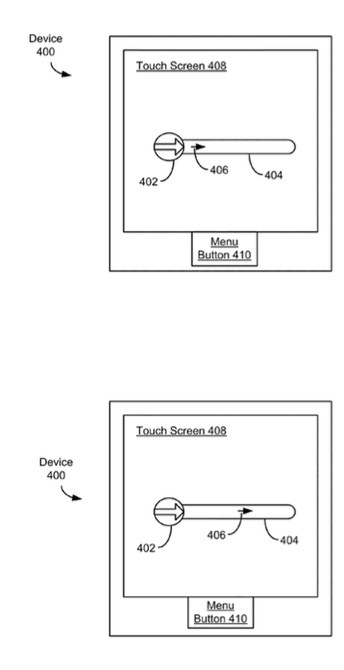A new Apple patent (number 8286103) at the U.S. Patent & Trademark Office shows that Apple is looking at new ways for your to unlock your iOS device — and, conceivably, a Mac as well. The patent is for unlocking a device by performing a gesture on an unlock image.
Per the patent, the device is unlocked if contact with the display corresponds to a predefined gesture for unlocking the device. The device displays one or more unlock images with respect to which the predefined gesture is to be performed in order to unlock the device.
The performance of the predefined gesture with respect to the unlock image may include moving the unlock image to a predefined location and/or moving the unlock image along a predefined path. The device may also display visual cues of the predefined gesture on the touch screen to remind a user of the gesture.
Here’s Apple’s background on the invention: “Touch-sensitive displays (also known as ‘touch screens’ or ‘touchscreens’) are well known in the art. Touch screens are used in many electronic devices to display graphics and text, and to provide a user interface through which a user may interact with the devices. A touch screen detects and responds to contact on the touch screen. A device may display one or more soft keys, menus, and other user-interface objects on the touch screen. A user may interact with the device by contacting the touch screen at locations corresponding to the user-interface objects with which she wishes to interact.
“Touch screens are becoming more popular for use as displays and as user input devices on portable devices, such as mobile telephones and personal digital assistants (PDAs). One problem associated with using touch screens on portable devices is the unintentional activation or deactivation of functions due to unintentional contact with the touch screen. Thus, portable devices, touch screens on such devices, and/or applications running on such devices may be locked upon satisfaction of predefined lock conditions, such as upon entering an active call, after a predetermined time of idleness has elapsed, or upon manual locking by a user.
“Devices with touch screens and/or applications running on such devices may be unlocked by any of several well-known unlocking procedures, such as pressing a predefined set of buttons (simultaneously or sequentially) or entering a code or password. These unlock procedures, however, have drawbacks. The button combinations may be hard to perform. Creating, memorizing, and recalling passwords, codes, and the like can be quite burdensome. These drawbacks may reduce the ease of use of the unlocking process and, as a consequence, the ease of use of the device in general.
“Accordingly, there is a need for more efficient, user-friendly procedures for unlocking such devices, touch screens, and/or applications. More generally, there is a need for more efficient, user-friendly procedures for transitioning such devices, touch screens, and/or applications between user interface states (e.g., from a user interface state for a first application to a user interface state for a second application, between user interface states in the same application, or between locked and unlocked states). In addition, there is a need for sensory feedback to the user regarding progress towards satisfaction of a user input condition that is required for the transition to occur.”
The inventors are Imran Chaudhri, Bas Ording, Freddy Allen Anzures, Marcel Van Os, Scott Forstall and Greg Christie.
Also appearing today at the U.S. Patent & Trademark Office are:
° Patent number 8284170 for a touch screen device, method, and graphical user interface for moving on-screen objects without using a cursor.
° Patent number 8285937 for fused store exclusive/memory barrier operation.
° Patent number 8285901 for communication between an accessory and a media player using an extended interface lingo.
° Patent number 8285860 for efficient service discovery for peer-to-peer networking devices.
° Patent number 8285851 for pairing a media server and a media client.
° Patent number 8284750 for radio telecommunications system and method of operating the same with polling.
° Patent number 8284748 for methods, systems, and computer-readable media for forming and tracking a location-sharing group.
° Patent number 8284546 for battery connector structures for electronic devices.
° Patent number 8282002 for a multi-barcode scan process.

